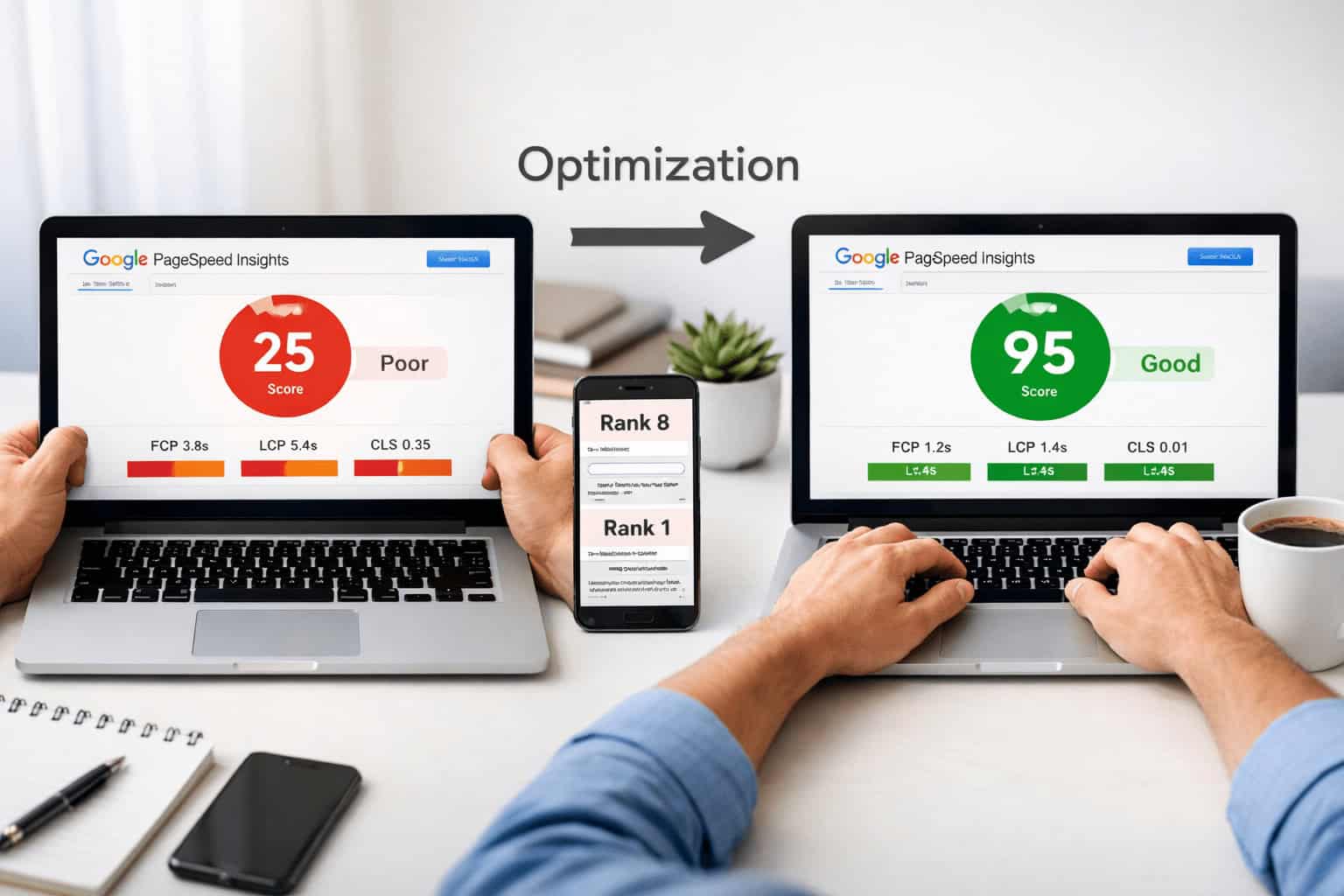Is SEO worth it in 2024?
In today’s digital landscape, Search Engine Optimization (SEO) has emerged as a critical component of any effective marketing strategy.
Consider some of these impressive SEO Statistics curated by Ahrefs.
- 68% of online experiences begin with a search engine. (BrightEdge)
- 63.41% of all US web traffic referrals come from Google. (SparkToro)
- 92.96% of global traffic comes from Google Search, Google Images, and Google Maps. (SparkToro)
- SEO drives 1,000%+ more traffic than organic social media. (BrightEdge)
- 60% of marketers say that inbound (SEO, blog content, etc.) is their highest quality source of leads. (HubSpot)
- SEO leads have a 14.6% close rate. (HubSpot)
For businesses seeking to increase their online presence, the importance of ranking well in search engines cannot be overstated.
SEO involves optimizing various elements of a website to improve visibility in organic search results, with the goal of driving more traffic and, ultimately, more customers to a business.
It’s a long-term investment that, unlike paid advertising, can lead to sustained organic traffic growth.
But the question remains. Is SEO worth it for small businesses?

Is SEO Worth It?
The worthiness of SEO comes into question when balancing the time, effort, and costs involved.
Especially for a small business, it’s vital to evaluate the return on investment that SEO offers.
With a plethora of digital marketing options available, businesses must decide whether investing in SEO will yield substantial benefits.
Developing an effective SEO strategy requires understanding search engine algorithms, implementing continuous on-page and off-page optimizations, and producing high-quality content.
Companies often face the decision of managing SEO in-house or outsourcing to specialized agencies, weighing the potential outcomes against the investment.
Key Takeaways
- SEO is crucial for enhancing online visibility and organic traffic.
- A strategic approach to SEO can significantly impact business growth.
- Evaluating SEO efficacy involves analyzing investment versus potential returns.
The Business Case for SEO
Investing in Search Engine Optimization (SEO) is essential for businesses aiming to enhance their online presence and drive revenue..
SEO stands out as a cost-effective way to generate organic traffic and increase brand awareness compared to other marketing strategies.
Understanding the Value of SEO
SEO encompasses a variety of strategies that help improve a website’s visibility in organic search results.
For businesses, this visibility is crucial as it brings in potential customers who are actively searching for services or products they offer.
A well-optimized site can lead to increased traffic and a higher conversion rate, thereby increasing revenue without the continuous expense of paid advertising.
SEO as a Long-Term Investment
SEO is not a one-time effort; it requires ongoing work and updates to maintain organic rankings over time.
Due to the nature of search engines and competition, results may take time to manifest.
However, once a robust SEO foundation is in place, businesses often see a snowball effect where their visibility leads to increased leads and revenue, compounding their return on investment (ROI).
Comparing SEO with Other Marketing Channels
When lined up against other marketing channels like paid search and social media, SEO requires less financial input after initial setup costs.
Organic traffic, unlike traffic from paid search or social media advertising, does not incur a cost per click or impression.
Moreover, SEO’s ability to target a specific audience through keyword research and content creation typically results in leads with a higher intent to purchase.
Budgeting for SEO
Investing in SEO can vary significantly based on whether a business chooses to have an in-house team, work with an agency, or hire freelancers.
Outsourcing to an SEO agency may incur a monthly fee, while an in-house SEO might necessitate a full-time salary plus the costs of tools and continued training.
The key is to consider the potential ROI and allocate the budget accordingly.
Measuring the Success of SEO
Success in SEO can be measured using several metrics that reflect the health and performance of a website in organic search.
Key performance indicators include organic traffic, conversion rate, leads, and revenue generated from organic search.
Tools such as web analytics can track these metrics over time, helping businesses evaluate the effectiveness of their SEO strategy and adjust where necessary.
Developing an Effective SEO Strategy
An effective SEO strategy is integral to boosting a website’s visibility and attracting quality traffic.
It encompasses meticulous keyword research, on-page optimizations, content creation and off-page tactics to establish authority—all aimed at enhancing organic search rankings.

Keyword Research Mastery
Keyword research is the foundation of SEO.
Utilizing tools like Google’s Keyword Planner, marketers assess search volume and keyword ranking to unearth terms aligned with their target audience and niche.
This process is crucial not only for blog and content creation but also for understanding consumer behavior.
To maximize efficiency, consider tools that use artificial intelligence to predict keyword relevance and competitiveness.
Optimizing On-Page Elements
On-page SEO involves tweaking website elements to improve organic search rankings.
This includes optimizing content for relevant keywords, ensuring the proper use of header tags, meta descriptions, and URLs.
Internal links should be strategically placed to enhance web development structure, guiding search engines and users alike.
Off-Page SEO: Building Authority
Off-page SEO is about increasing your site’s authority and trustworthiness through backlinks.
Acquiring links from reputable sources signals to Google and other search engines that others vouch for your content, which can markedly improve your site’s organic rankings.
Methods include guest blogging, digital PR, and leveraging local social media marketing..
Local SEO for Targeted Outreach
Local SEO tailors your strategy to attract local business leads.
By optimizing for geo-specific keywords, creating listings in local directories and employing other Local SEO tactics, businesses can appear prominently in Google‘s local search results.
This targeted approach connects products and services with local consumers more effectively.
Staying Ahead with SEO Trends and Tools
The realm of SEO is ever-evolving with the advent of artificial intelligence and shifts in Google’s algorithms.
To stay ahead, businesses must keep a pulse on SEO trends and leverage latest tools.
This includes SaaS platforms for automation and SEO experts for insights, maintaining an edge in organic search strategies.
SEO Decision Making: In-House vs Outsourcing
When deciding between keeping SEO tasks in-house or outsourcing to an agency or consultants, business owners must evaluate the expertise available, the quality of SEO services, and the potential return on investment (ROI).
Pros and Cons of In-House SEO
Advantages:
- Control: Businesses have direct control over their SEO strategy and execution.
- Alignment: An in-house team is closely aligned with the company’s goals and culture.
Disadvantages:
- Resource Constraints: In-house teams may lack certain expertise and can be limited by smaller budgets and staffing.
- Knowledge Gaps: Staying up-to-date with SEO best practices requires ongoing training which can be a challenge for an in-house team.
Working with SEO Agencies and Consultants
Agencies and Consultants offer specialized services and typically bring a wide array of experiences from different campaigns and industries. They can offer:
- Diverse Expertise: Agencies usually have a team of SEO experts with diverse skills and experiences.
- Scalability: Outsourcing allows businesses to scale their SEO efforts up or down without being bound by internal resource limits.
However, working with external partners can sometimes lead to:
- Less Control: Marketers may find less direct control over their SEO strategy.
- Trust Issues: Finding a trustworthy agency can be a challenging task for businesses.
Evaluating Expertise and SEO Service Quality
When evaluating potential in-house hires or agencies, consider:
- Case Studies: Reviewing case studies can demonstrate an agency’s ability to deliver results and drive qualified, organic traffic.
- ROI: Both strategies should be evaluated on their potential to deliver a strong ROI through increased organic traffic and conversion rates.
Understanding the pros and cons of in-house SEO and evaluating the credentials of SEO agencies and consultants is crucial for marketers to make informed decisions that will lead to improved organic search results, increased qualified traffic, and better ROI.
In Conclusion
There is no question that SEO remains one of the most effective digital marketing strategies available to businesses today.
The only question each business owner has to evaluate is SEO worth it enough to invest in.
We would submit that every business should be investing in establishing their organic online presence that can drive visitors to their website and business for many years to come.
However, investing in SEO doesn’t have to be an either or proposition.
A diverse digital marketing mix of tactics is always a better approach. It’s just a matter of understanding which tactic will produce the best ROI for your current and future objectives and adjust accordingly.
If you’d like help evaluating the effectiveness of your digital marketing mix and is SEO is worth it for your business, schedule a call with us today!
Frequently Asked Questions
The value of SEO is often questioned, particularly when evaluating the investment involved.
Here we address common inquiries pertaining to answering is SEO worth it or not.
What benefits do small businesses gain from investing in SEO?
Investing in SEO helps small businesses increase their online visibility, drive targeted traffic to their website, and enhance user experience. It is a cornerstone for building online authority and credibility in their niche.
How does SEO remain relevant with the changing algorithms of search engines?
SEO adapts to algorithm changes by focusing on producing high-quality, relevant content and building a positive user experience. Over time, these core principles have remained consistent, even as the finer points of optimization tactics evolve.
How long does SEO take to see results?
The timeline for SEO results can vary depending on several factors, including your website’s current state, the competitiveness of your industry, and the SEO strategies you’re implementing. Read our blog about SEO timelines where we address this question extensively.
What are the key reasons to consider paying for professional SEO services?
Professional SEO services bring expertise in keyword research, content optimization, and technical website enhancements that can significantly increase search rankings and drive qualified traffic. They help in staying current with the latest SEO trends and practices.
What potential drawbacks should businesses be aware of before implementing SEO strategies?
Businesses should be aware of the time it takes to see SEO results and the continual effort required for maintenance. Furthermore, ineffective or unethical SEO practices can result in penalties from search engines, negatively impacting online visibility.
How necessary is SEO for online visibility and success in today’s digital age?
SEO is essential for online visibility and achieving success in the digital market. It ensures a website is easily discoverable by search engines and users, leading to better traffic quality and higher conversion rates.



